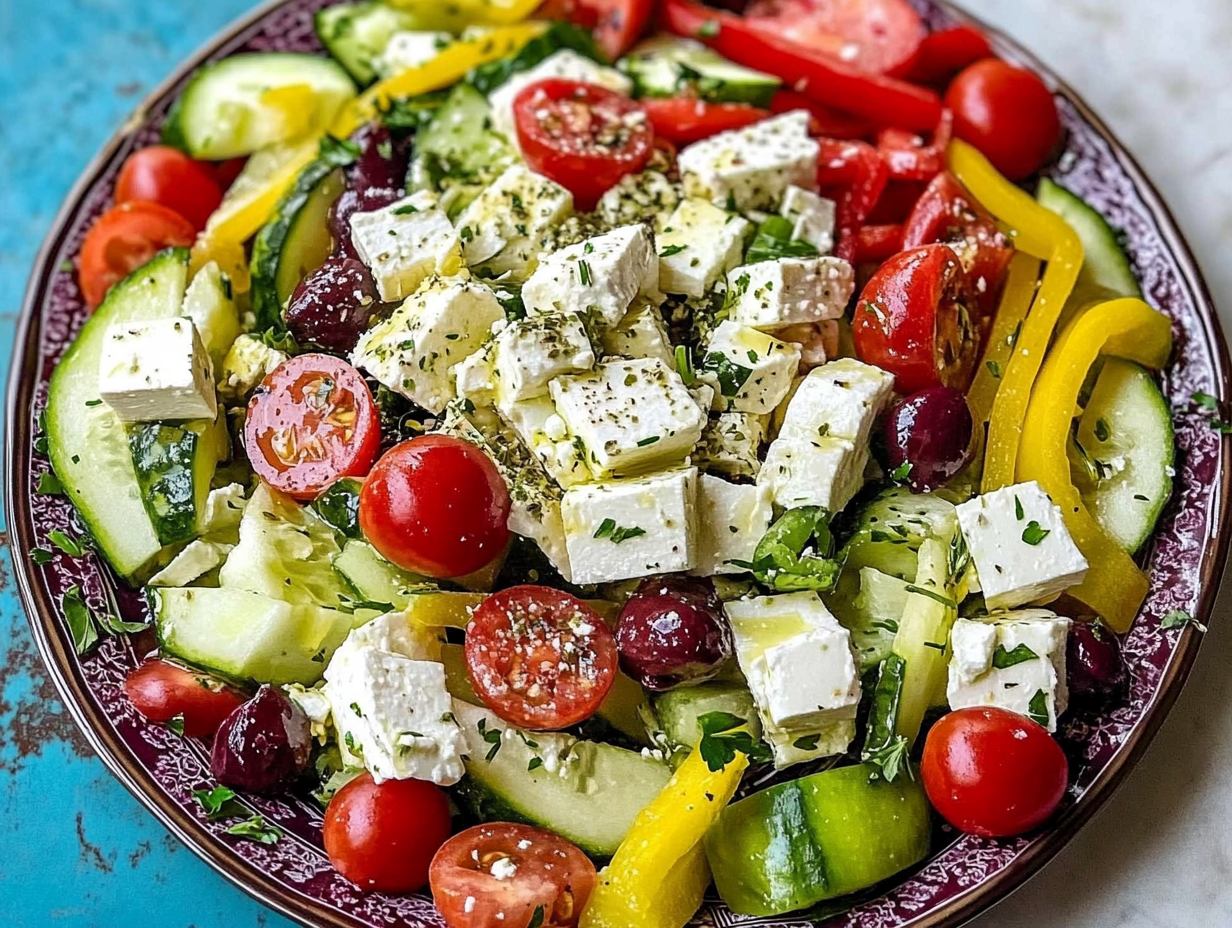The Mediterranean diet is famous for its health benefits and delicious flavors. At its core is the classic Greek salad recipe. Known as ‘Horiatiki’ in Greece, it’s more than a side dish; it’s a celebration of Greek cuisine.
This salad combines juicy tomatoes, crunchy cucumbers, tangy red onions, salty Kalamata olives, and creamy feta cheese. It’s a healthy meal that’s both filling and nutritious. Let’s explore the world of fresh ingredients and simple flavors that have stood the test of time.
Key Takeaways
- Mediterranean diet cornerstone: The Greek salad is a core element of this healthful and flavourful diet.
- Horiatiki simplicity: Authenticity lies in the simplicity of its fresh ingredients.
- Healthy meal: Perfect for those seeking a balance of flavor and nutrition.
- Fresh produce focus: The salad’s reliance on the freshest ingredients is key to its iconic taste.
- Authentic Greek cuisine: A cultural journey through the tastes of Greece.
- Easy-to-follow Greek salad recipe: Makes it accessible for any home cook to prepare a traditional meal.
The Timeless Appeal of a Traditional Greek Salad
The traditional Greek salad is loved for its simplicity and deep roots in the Mediterranean lifestyle. It’s celebrated for its cultural and culinary tradition. This dish promotes healthy eating and brings joy to family and friends.
The Greek salad benefits go beyond just being healthy. It captures the essence of the Mediterranean lifestyle, which is both appealing and good for you. The ingredients are chosen carefully to balance flavors and offer a refreshing taste that has been enjoyed for generations.
- Fresh cucumbers, ripe tomatoes, red onions, and crisp green peppers form the base.
- The tang of olives and the creaminess of feta cheese add a signature richness.
- Olive oil, another cornerstone of Mediterranean cooking, ties the dish together with its hearty and healthy fats.
The ingredients in Greek salad also reflect Greece’s cultural identity and culinary tradition. In Greece, cooking is about more than just feeding the body. It’s about nourishing the soul. Nutritionists say Greek salad is great for its vitamins, minerals, and heart-healthy fats, making it perfect for a healthy eating plan.
The Greek salad’s popularity shows how traditional dishes can be a key part of modern diets. It offers Greek salad benefits and a glimpse into a serene, sun-kissed lifestyle. This mix of history, taste, and health benefits keeps Greek salad loved around the world, crossing cultural and time boundaries.
Crafting the Perfect Classic Greek Salad
Welcome to the ultimate guide on how to make Greek salad. Here, traditional Greek recipes come to life in your kitchen. Let’s create a homemade Greek salad with vibrant Mediterranean flavors.
Essential Ingredients for Authentic Taste
Every classic Greek salad starts with top-notch ingredients. Here’s what you’ll need:
- Ripe tomatoes, juicy and rich in color
- Crisp cucumbers, sliced thin
- Red onions, for a sharp bite
- Green bell peppers, adding a sweet crunch
- Kalamata olives, a must for their salty depth
- Feta cheese, crumbly and briny
- Extra virgin olive oil, for a smooth finish
These ingredients are the heart of any Greek salad. Each adds its own unique texture and flavor.
Step-by-Step Assembly for Peak Freshness
Assembling Greek salad is both an art and a science. Follow these steps to maximize freshness and flavor:
- Begin by layering sliced tomatoes, cucumbers, and bell peppers in a large bowl.
- Add red onions and generously scatter Kalamata olives.
- Top with a thick slice of feta cheese and a sprinkle of dried oregano.
- Drizzle with extra virgin olive oil just before serving to maintain the crispness of the vegetables.
Proper layering enhances the interaction between the ingredients. This ensures every bite is infused with the essence of Greece.
Dressing: The Heart of Mediterranean Flavors
The Greek salad dressing is key in tying all the flavors together. Here’s a quick dressing recipe to make your own olive oil vinaigrette:
- Combine 3 parts extra virgin olive oil with 1 part red wine vinegar.
- For a burst of freshness, add a squeeze of lemon juice.
- Mix in minced garlic, dried oregano, and salt to taste.
- Whisk until the mixture is well emulsified.
The simplicity of this olive oil vinaigrette lets the natural flavors of the ingredients shine. It creates a delightful harmony typical of traditional Greek recipes.

Nutritional Benefits of a Greek Salad
Exploring the health benefits of a Greek salad shows why it’s great for those watching their diet. It’s packed with fresh veggies, healthy fats, and proteins. This makes it perfect for keeping weight in check and boosting overall health.
The salad starts with leafy greens like romaine or spinach. These greens are full of vitamins and minerals that keep us going all day. Tomatoes, cucumbers, onions, and olives add antioxidants. These fight off stress and inflammation in our bodies.
- Low-Calorie Composition: Ideal for calorie-conscious eaters.
- High in Dietary Fiber: Great for digestion and satiety.
- Rich in Beneficial Fats: Thanks to extra virgin olive oil and feta cheese, which promote heart health.
Feta cheese adds flavor and probiotics to the salad. Probiotics help our gut health and digestion. So, a Greek salad is not just tasty. It’s also a smart, health-benefiting choice for any diet.
Pairing Your Salad with the Perfect Meal
Turning a classic Greek salad into the main dish of a Mediterranean meal is all about pairing. Mixing different Mediterranean dishes with your salad creates a perfect blend of flavors. This blend captures the true spirit of Greek cuisine.
Complementing Dishes for a Full Greek Experience
Choosing the right Greek entrees and side dishes for your salad is exciting. The Mediterranean diet offers many tasty options:
- Grilled Lamb – A classic Greek dish, its strong taste goes well with the salad’s crisp freshness.
- Moussaka – This dish, with its layers of eggplant, meat, and béchamel sauce, pairs well with the salad’s lightness.
- Grilled Seafood – Choose lighter seafood like grilled octopus or squid to keep the Mediterranean theme.
- Spanakopita – This savory spinach pie adds a nice texture and flavor contrast when served with a Greek salad.
Beverages to Enhance Your Salad Enjoyment
Choosing the right drinks is important to make your meal better. Greek wines and traditional Greek drinks can bring out the salad’s flavors:
- Greek White Wines – Pick a crisp Assyrtiko or a fragrant Moschofilero to pair with your salad for a refreshing taste.
- Ouzo – This traditional Greek drink, with its distinct anise flavor, contrasts well with the salad’s tangy elements.
- Retsina – Try this resin-infused wine for a unique taste that’s been part of Greek culture for centuries.
Knowing these pairings will make your dining experience better. Whether it’s entrees, side dishes, or drinks, each part is crucial for a true Mediterranean feast.
Conclusion
Enjoying a classic Greek salad is more than just eating. It’s a journey into the heart of Mediterranean dining. We’ve seen how easy it is to make, making it a key part of healthy eating.
The salad’s colors, textures, and tastes are not just pleasing. They also feed our bodies and souls. This dish is a feast for the senses.
Eating a Greek salad is good for your health, just like the Aegean Sea is clear. It shows a way of life that values wellness and joy in every meal. Greek salad can be a main dish or part of a big Mediterranean feast.
It’s a way to refresh and renew ourselves. It reminds us that food can be tasty and good for us. The Mediterranean diet is all about finding this balance.
We hope you’ll make Greek salad a regular part of your meals. Let it bring the joy of Greek cuisine to your table. Each bite is a celebration of tradition and a step towards a healthy, vibrant life.
So, enjoy the simplicity, freshness, and health benefits of Greek salad. Let it be a part of your journey towards a better, sun-kissed lifestyle. Until next time, savor every bite.

